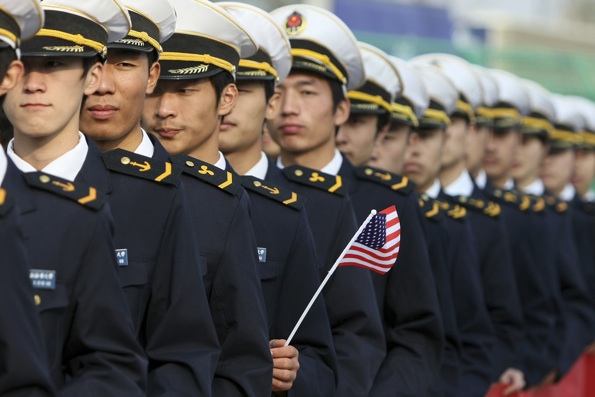For one thing, how will China deal with issues that involve its sovereignty claims but that also touch public goods and issues of the commons?
I’ve been struck in recent weeks by just how much the United States and China are talking past each other—one keeps talking about sovereign rights and claims, while the other talks almost entirely about international rights and customs. So, quite apart from Beijing’s sovereignty claims to the sea, how China speaks and acts with respect to these issues—rights of passage, freedom of navigation, interpretations of customary international law—will deeply affect perceptions of its exercise of power.
Second, Beijing has railed at the United States for ‘internationalising’ the issues in the sea. But rights of passage and freedom of navigation are not bilateral issues. They touch the rights and interests even of non-claimants. That’s one reason so many non-claimants to formations in the sea spoke up at the Hanoi ministerial, including Singapore, Japan, and Australia. Indeed, if the issues at stake are purely bilateral, then Beijing is, in effect, denying the relevance of issues of the commons. And many in East Asia, not just the United States, will surely beg to differ.
Many states view the South China Sea not just as an arena for competing territorial claims but also as a place where issues of the commons are at stake: whether all states have equal rights of transit and passage, and how (and by whom) rights of transit and passage are to be enforced.
Third, then, Beijing’s choices about the sea will affect perceptions of how a rising China plans to deal with the much broader question of public goods. Put a bit differently, if China is a ‘stakeholder’ in the international system, then what does its approach to the South China Sea tell us about how it will exercise that stake?
Ironically, Beijing has derived considerable benefit from the US provision of sea-lane security in and beyond Asian waters. That’s ironic because China is, as we all know, so deeply unhappy with US activities in the international waters off its coasts. And Beijing especially despises US maritime and air surveillance.
But for all the Chinese grumbling about American ‘hegemony’ (for example in the People’s Daily by the ever-confrontational Major General Luo Yuan), how many countries have fared better from American primacy than has China?
Seriously.
Some in China’s strategic class argue that Beijing chafes under the present international system. (And what major power doesn’t wish to shape and adapt the rules of the system to its own advantage? China is certainly no exception in this regard). But, over the last thirty years—in an era of relative US primacy—China has wracked up achievements unprecedented in economic history, re-emerged as a major power, and joined nearly every top table of international relations. And China has done so while taking a conspicuous free-ride on the American provision of public goods, not least provision of security in international waters. In short, who has fared better in recent decades than China?
If Chinese strategists now wish to alter, or even end, US practices, is Beijing prepared to assume the burdens of the commons itself? And, if so, does it propose to do so in partnership with the United States and others—or alone?
The United States isn’t going anywhere in Asia, not least on issues of navigation and maritime passage. But the Chinese debate about this question will say much about a rising China. After all, we know that sovereignty trumps most other considerations in Chinese foreign policy. But a stakeholder in the international order can’t simply divorce its sovereign claims from the public goods and common resources affected by those claims.
Evan A. Feigenbaum is a Senior Fellow at the Council on Foreign Relations.
This article was first published here by the Council on Foreign Relations’ Asia Unbound blog.

